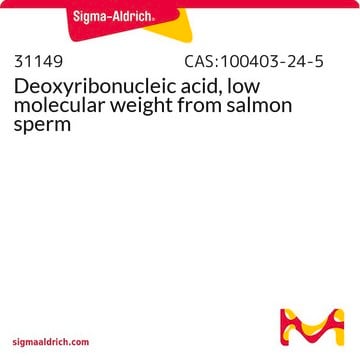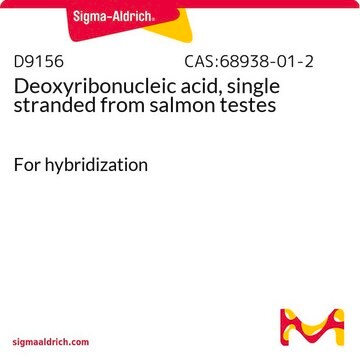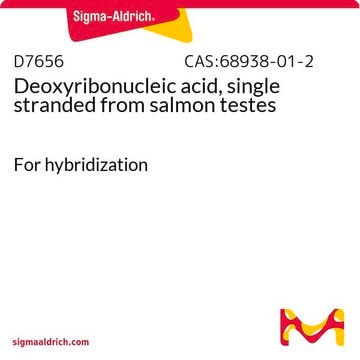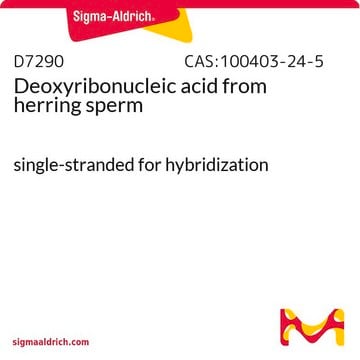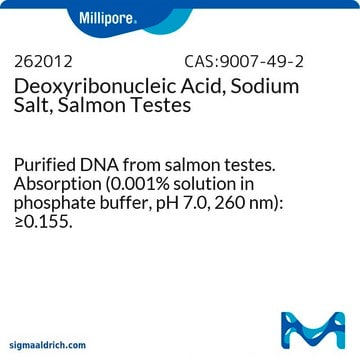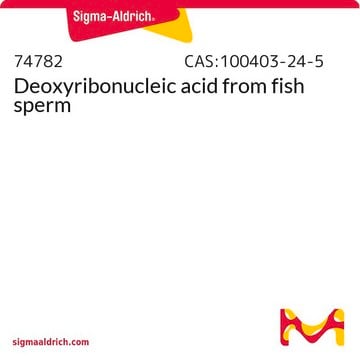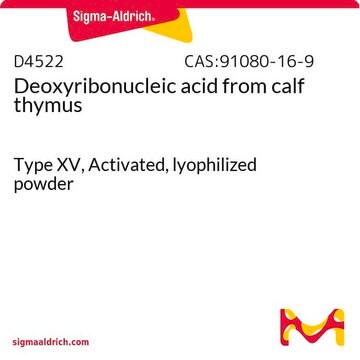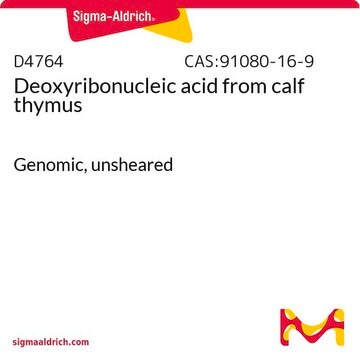D6898
Deoxyribonucleic acid sodium salt from herring testes
Type XIV
Synonym(s):
DNA
Sign Into View Organizational & Contract Pricing
All Photos(3)
About This Item
Recommended Products
type
Type XIV
form
solid
storage temp.
2-8°C
Looking for similar products? Visit Product Comparison Guide
Related Categories
General description
Deoxyribonucleic acid sodium salt from herring testes, also known as HtDNA is a natural source of DNA designed for DNA binding agent studies. The detection limits of HtDNA are around 5.0ng and linear ranges of light scattering intensity (I(LS)) is 0.05-2.5 mµg.
Application
Deoxyribonucleic acid sodium salt from herring testes is used in studies of DNA binding agents that modulate DNA structure and function. Herring testes DNA is also used in physicochemical studies of DNA behavior in solution.
Storage Class Code
13 - Non Combustible Solids
WGK
WGK 3
Flash Point(F)
Not applicable
Flash Point(C)
Not applicable
Personal Protective Equipment
dust mask type N95 (US), Eyeshields, Gloves
Certificates of Analysis (COA)
Search for Certificates of Analysis (COA) by entering the products Lot/Batch Number. Lot and Batch Numbers can be found on a product’s label following the words ‘Lot’ or ‘Batch’.
Already Own This Product?
Find documentation for the products that you have recently purchased in the Document Library.
Customers Also Viewed
X Du et al.
Talanta, 55(1), 93-98 (2008-10-31)
The interaction of histone with nucleic acids was characterized by light-scattering measurement using a common spectrofluorometer. Thereby, a sensitive and convenient method for the determination of nucleic acids was established. At pH 4.5-6.5, the interaction of histone with nucleic acids
Larisa I Labzin et al.
The EMBO journal, 38(21), e101365-e101365 (2019-08-31)
Inflammasomes are potent innate immune signalling complexes that couple cytokine release with pro-inflammatory cell death. However, pathogens have evolved strategies to evade this cell autonomous system. Here, we show how antibodies combine with innate sensors in primary human macrophages to
Assaf Marcus et al.
Immunity, 49(4), 754-763 (2018-10-18)
Detection of cytosolic DNA by the enzyme cGAS triggers the production of cGAMP, a second messenger that binds and activates the adaptor protein STING, which leads to interferon (IFN) production. Here, we found that in vivo natural killer (NK) cell killing
Katherine R Balka et al.
Cell reports, 31(1), 107492-107492 (2020-04-09)
Stimulator of Interferon Genes (STING) is a critical component of host innate immune defense but can contribute to chronic autoimmune or autoinflammatory disease. Once activated, the cyclic guanosine monophosphate (GMP)-adenosine monophosphate (AMP) (cGAMP) synthase (cGAS)-STING pathway induces both type I interferon
Gillian Dunphy et al.
Molecular cell, 71(5), 745-760 (2018-09-08)
DNA damage can be sensed as a danger-associated molecular pattern by the innate immune system. Here we find that keratinocytes and other human cells mount an innate immune response within hours of etoposide-induced DNA damage, which involves the DNA sensing
Our team of scientists has experience in all areas of research including Life Science, Material Science, Chemical Synthesis, Chromatography, Analytical and many others.
Contact Technical Service

